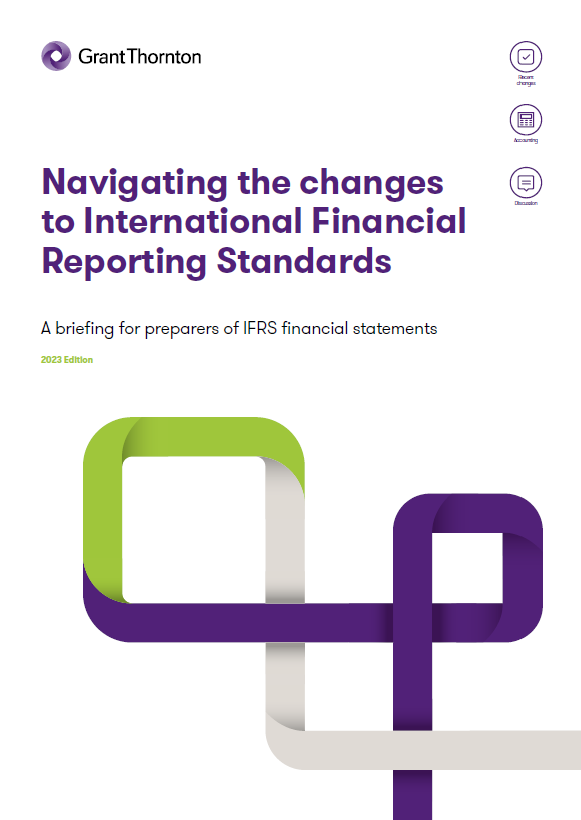-
Audit methodology
At Grant Thornton, we use a single audit methodology across our global network. This means that our clients gain the same proven, high-quality approach wherever they are.

-
Financial statements and consolidated financial statements
Preparation of monthly, quarterly or annual report and consolidated report on the basis of information presented by the client.
-
Financial Accounting
Effective bookkeeping and financial accounting are essential to the success of forward-thinking organisations. To get the optimum benefit from this part of your business, you'll need an experienced team behind you.
-
Tax compliance
Tax is likely to have an impact on almost every business decision you make. Whatever your business’s specific needs, we respond quickly and devise solutions tailored to you. We perform VAT, income tax, social tax and other tax accounting as well as present tax declarations to the tax authorities.
-
Chief financial officer service
Chief Financial Officer services include the periodic reporting, information systems standardization, internal document management and information flow optimization, budget preparation, cost accounting, cash flow and working capital management, financial analysis, investment return evaluation for managers.

-
International taxation
Grant Thornton operations in the Baltic States give us an access to the international expertise and allow advising the client on the minimisation of tax risks arising from conducting business in a foreign tax jurisdiction. We also consult foreign investors in finding an optimum group structure and form of enterprises in Lithuania and other Baltic States.
-
Transfer pricing
We advise the management bodies of local and multinational groups of companies in issues concerning transfer pricing of intra-group transactions and, if necessary, in the preparation of the relevant compliance documents. We also assist in preparing transfer pricing policies in order that future transactions are priced in accordance with the local as well as international regulations.
-
VAT refunds
We advise foreign clients in issues concerning the refund of value added tax paid in Lithuania, and Lithuanian clients – in the refund of value added tax paid in the EU member states. If necessary, we carry out these procedures on behalf of the client.
-
Profit tax, tax incentives
Our tax advisory department consults local and international clients in both everyday and specific taxation issues related to business activities.
-
Due diligence
Making the right investment decision can have a significant impact on shareholder value. To make an informed investment decision and create the best value from the transaction you will need the following an understanding of the target business identification and understanding of key business drivers an understanding of all the relevant issues clear analysis, conclusions and recommendations.
-
Assistance and representation during tax investigations, inspections, disputes
We provide services for registration in the Register of Taxpayers and the Register of VAT Payers. We represent clients' interests in tax disputes at the State Tax Inspectorate, Tax Disputes Commission, courts and other institutions.

-
Legal advisory for business start
We assist to quickly establish a company, branch or permanent establishment in Lithuania, open a bank account, VAT registration and obtain all necessary licenses for activity.
-
Legal advisory for business development
Our team has gained the greatest experience in advising international companies on the management of groups of companies. We advise and implement reorganizations or liquidations. Together with a team of tax and financial advisors, we perform a comprehensive due diligence (tax, legal & financial).
-
Labor law for CEOs and employees
We provide modern labor law solutions for the CEO, C-level managers and employees, which are tailored specifically to your business industry. We will take care of well-judged employment contracts and benefits package, protection of confidential information and non-compete agreements, handling of employee data or stock option rules, posting of employees, employment of EU and third-country nationals, organization of telework.
-
Fintech
With extensive experience in money laundering prevention and compliance and a strong team of financial experts, we advise clients on financial services, electronic money, licensing of payment institutions, capital formation, listing of mutual lending platform operators and other operational issues.
-
Migration and relocation
We assist you, your family members and employees of the organization to obtain national and European Union (Schengen) visas, residence permits, e-resident status, provide mediation letters and ensure a smooth relocation to Lithuania.
-
Due diligence
Making the right investment decision can have a significant impact on shareholder value. To make an informed investment decision and create the best value from the transaction you will need the following an understanding of the target business identification and understanding of key business drivers an understanding of all the relevant issues clear analysis, conclusions and recommendations.
-
Fintech advisory
The rapidly changing world and evolving technology are driving the development of new business models such as acting as a payment institution, a provider of virtual currency services and a financial institution. Grant Thornton Baltic provides support and advice to these companies.
-
Corporate finance management
Building a successful business requires a clear vision backed by a focused strategy. To achieve this vision, businesses must negotiate an increasingly complex environment.
-
Business Valuations
Choosing the right valuation method is the most important element in the process of estimating the fair value of a business as it must be adequate in terms of the purpose and object of the valuation. Grant Thornton uses only proven and generally accepted methods from among the wide range of income, asset and market approaches. Having conducted a preliminary analysis of the object and purpose of the valuation, we identify the method that will be the most appropriate considering the situation and characteristics of a given enterprise and the business sector in which it operates. Prior to commencing valuation, we also identify the documents necessary in the process.
-
Mergers and acquisitions
We provide advice to clients in all material aspects of the process of conducting transactions: finding a candidate for buyer, purchase or merger, initial analysis and valuation, negotiations, due diligence, structuring transaction price, preparing legal documentation and formal closing of the transaction. We also provide consultation for management buyouts.
-
Protection of Interests of Bondholders'
Grant Thornton provides bondholders' advocacy and protection services. We have resources, knowledge and the latest technology. Defending the interests of bondholders · Representing the interests of bondholders
-
External Financial Management Services
Providing an external financial management services makes it possible to manage a company’s finance on a day-to-day basis by a competent economist, without the need of offering full-time employment. By cooperating with experts on managing big-budget projects, we provide our clients with excellent support in comprehensive management of company’s finance.
-
Training
Financial Management Training and Seminars. Our experts have significant regional competence and close co-operation with our global colleagues. They happily share their expertise with our clients.

-
Internal Audit Services for Financial Sector Companies Licensed in Lithuania
Internal audit services adapted to Lithuanian financial sector companies ensure compliance with regulatory acts, risk management and operational excellence.
-
Internal Audit Services for EU/Foreign Aid Projects
Internal audit for EU/foreign aid fund projects helps to ensure compliance of activities and related costs with requirements.
-
Internal Audit for the Companies Certified by ISO
Internal auditing ensures ISO standard compliance, evaluates management system effectiveness, and gathers objective evidence of performance.
How has blockchain been put into practice as part of live, commercial business solutions?
"[Blockchain] spells the death of the invoice," proclaims Lee Pruitt, co-founder and CEO of spend-control-as-a-service provider InstaSupply.
"There's a huge amount of inefficiency today in business-to-business transactions," he continues. "There are a lot of steps involved when businesses place orders with suppliers and how they match them with the supplier's invoices in order to be able to pay them.
"When the accounts payable department goes through an invoice, someone has to check they received all the items being invoiced for. And is it the right price? Did the goods arrive on time? When is the supplier asking for payment? Are the payment terms correct? Is it even the right supplier?"
If there's the slightest query, the invoice is pushed to another department to get reviewed again at length by another human. Business-to-business is one of the sectors in which making and settling a transaction can involve a massive amount of manual work. In some cases, suppliers are forced to wait up to 90 days to get paid.
"Blockchain eliminates all of that," says Pruitt, "because you have a digital form of trust and verification that takes out a lot of these transactions being handled today manually."
Blockchain and data optimisation
InstaSupply is not alone in making use of blockchain in this fashion: the likes of Barclays, Maersk and Microsoft are among the very large enterprises leading the charge.
Maersk is not the only shipping company throwing its weight behind blockchain networks. Marine Transport International has developed a marine supply network using blockchain to connect stakeholders, comprising ports, shipping lines, land-based haulers, freight forwarders and other interested parties.
Marine Transport's CEO, Jody Cleworth, recounts how it came about: "Around July of 2016, there was a regulatory change in the shipping industry. This enabled us to create connectivity inside the land-side supply chain – that's before the container gets to the terminal: the truck, the load point, the shipper, the physical asset-on-asset loading of those goods inside the container.
"We realised that we could create an application which would create an ecosystem amongst these different actors to accelerate data along the land-side supply chain to meet this change. We could communicate the specifics of that container to the terminal before it was allowed into the terminal or allowed on board the ship."
Streamlining through blockchain
Having considered and quickly dismissed the bitcoin blockchain, the company came across tech specialists Agility Sciences which was offering an enterprise-grade blockchain-as-a-service that anyone can connect to. Marine Technology discovered it could connect both legacy systems and new age EDI (electronic data interchange) protocols alike into the network, creating what Cleworth calls "a democratised connectivity".
"Now as containers are loading, data comes into the network, we process it with smart contracts, each a billable event. Then we update the applications so that users such as ourselves get notified with the various events that are going on in the container, and we push that data outside the network to the ports and the shipping lines before the truck driver has even changed into second gear to get out of that load point."
The barrier to entry to the network is low since participants themselves power it and provide its storage, whether that be via Amazon Web Services, Google, IBM Bluemix, or even their own office server. Marine Transport then earns specific fees automatically when milestones are reached in the smart contracts.
Blockchain and energy
Using blockchain to level the field was also the key driver behind a distributed energy trading system rolled out in Australia earlier this year by Power Ledger.
"I was looking at the proliferation of photovoltaic (PV) solar panels which many people have installed onto their rooftops over here," recalls Power Ledger MD and co-founder David Martin.
"The problem is that there's no way of guaranteeing that you will get the benefit of the investment you make in rooftop PV. I might be working from 7am 'til 7pm, so the sun's gone down by the time I get home from work but my next door neighbour works from home, so he's getting all the benefit of that free electricity off the roof."
This scenario is a serious disincentive to install rooftop PV panels on blocks of flats, which account for 35 per cent of the housing stock in Australia. A big chunk of the population is therefore excluded from the distributed energy economy.
"What we needed was a technology platform able to demonstrate where energy was coming from at a distribution level and reward the person whose generation was being sold," says Martin. "Blockchain provided us with the ability to do that: it allows us to identify the provenance of every kilowatt hour that is generated on-site or at a consumer's premise and through a transactive platform and trading algorithm that energy is allocated to a particular consumer."
Blockchain and trust
The immutable qualities of blockchain also ensure any trading arrangement can be trusted according to terms, conditions and a financial agreement tied into it.
One property making use of this system right now is a 14-unit development in Fremantle, Australia, designed for people on low-income support. The owners, a housing association, already owned the PV and battery system, and wanted to provide the cheapest electricity to their tenants in a fair manner.
The Power Ledger system sits behind the master meter of the property, identifying the consumption of energy per flat, where that energy came from and how it is priced; if one tenant uses more energy than his neighbour, he will exhaust his own discounted allocation from the rooftop PV without taking anyone else's automatically switching to energy from the network and paying the full retail price for it.
Martin feels that blockchain's boost to the growing distributed energy economy will ultimately force the major energy companies to adapt their own approach to the market.
A cultural shift
Markus Veith, partner at Grant Thornton US shares this view of blockchain as a driver for cultural change. He uses the analogy of the appearance of smartphones: they didn't make us work faster so much as change the way we do things.
The real-world example he gives is cross-border peer-to-peer payments technology company, Circle, a rising star with whom he has been working over the last three years. Using Circle's smartphone app, you can transfer money between users across borders free of charge and instantaneously.
Veith outlines a scenario: "Let's say you're a student originally from Brazil studying in the US and you ask your parents to send you money, say $500. Your parents in Sao Paolo then go in the app and send the equivalent of $500 in the Brazilian currency Real translated into dollars, and it arrives in a split second in your account. And it's free."
Blockchain acts as a trusted recording system, validating the transfer of funds without further intermediaries and automating the settlement between accounts. Once Circle customers have established their identities on its blockchain, trust and validation are a given.
The blockchain platform reduces the risk of collusion, fraud and cyber-crime in financial services. "It's much more difficult to hack into a blockchain ledger than a traditional ledger in which you have one server," observes Veith. "With a blockchain you have multiple servers and every server validates the blockchain. If someone tries to hack a server or fake a transaction, all the others will kick it out."
The potential for blockchain based business solutions is now out there, it's just about utilising it.


